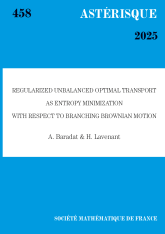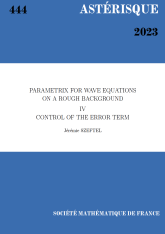De la minimisation entropique par rapport au mouvement brownien branchant au transport optimal non équilibré et régularisé
Regularized unbalanced optimal transport as entropy minimization with respect to branching Brownian motion

- Consulter un extrait
- Année : 2025
- Tome : 458
- Format : Électronique, Papier
- Langue de l'ouvrage :
Anglais - Class. Math. : 49N15, 49Q22, 60H30, 60J80 ; 35K58, 46E30, 60G57
- Nb. de pages : VIII + 194
- ISBN : 978-2-37905-211-8
- ISSN : 0303-1179 (print), 2492-5926 (electronic)
- DOI : 10.24033/ast.1247
Nous considérons le problème consistant à minimiser l’entropie relative d’une loi par rapport à la loi d’un mouvement brownien branchant de référence, sous des contraintes de densité aux temps extrémaux. Nous appelons ce problème le problème de Schrödinger branchant, par analogie avec le problème de Schrödinger classique, où le processus de référence est un mouvement brownien standard. Alors que le problème de Schrödinger classique est lié au transport optimal régularisé (également appelé transport optimal entropique), nous étudions ici le lien entre le problème de Schrödinger branchant et le transport optimal non équilibré et régularisé.
Ce lien se manifeste à deux niveaux. Tout d’abord, nous montrons par des arguments de dualité que les valeurs de ces deux problèmes de minimisation sont intimement liées : en effet, la valeur du transport optimal non équilibré et régularisé (considérée comme une fonction de la densité initiale et de la densité finale) correspond à la relaxation semi-continue inférieurement de la valeur du problème de Schrödinger branchant. Ensuite, nous établissons une correspondance explicite entre les compétiteurs de ces deux problèmes. Pour cela, nous donnons une description détaillée des lois ayant une entropie finie par rapport à un mouvement brownien branchant de référence.
Nous étudions également la limite de bruit nul, lorsque la diffusivité du mouvement brownien branchant tend vers zéro. Dans ce cas, nous montrons que notre modèle de transport optimal converge vers le transport partiel optimal. Nous présentons aussi des arguments formels expliquant pourquoi si l’on veut obtenir un problème qui se rapproche du transport optimal, l’étude du mouvement brownien branchant est plus adaptée que celle d’autres processus de Markov à valeurs mesures tels que les superprocessus.
Enfin, nous expliquons comment ce problème peut être résolu numériquement : la formulation dynamique du transport optimal non équilibré et régularisé peut être discrétisée et résolue en utilisant des outils d’optimisation convexe.


